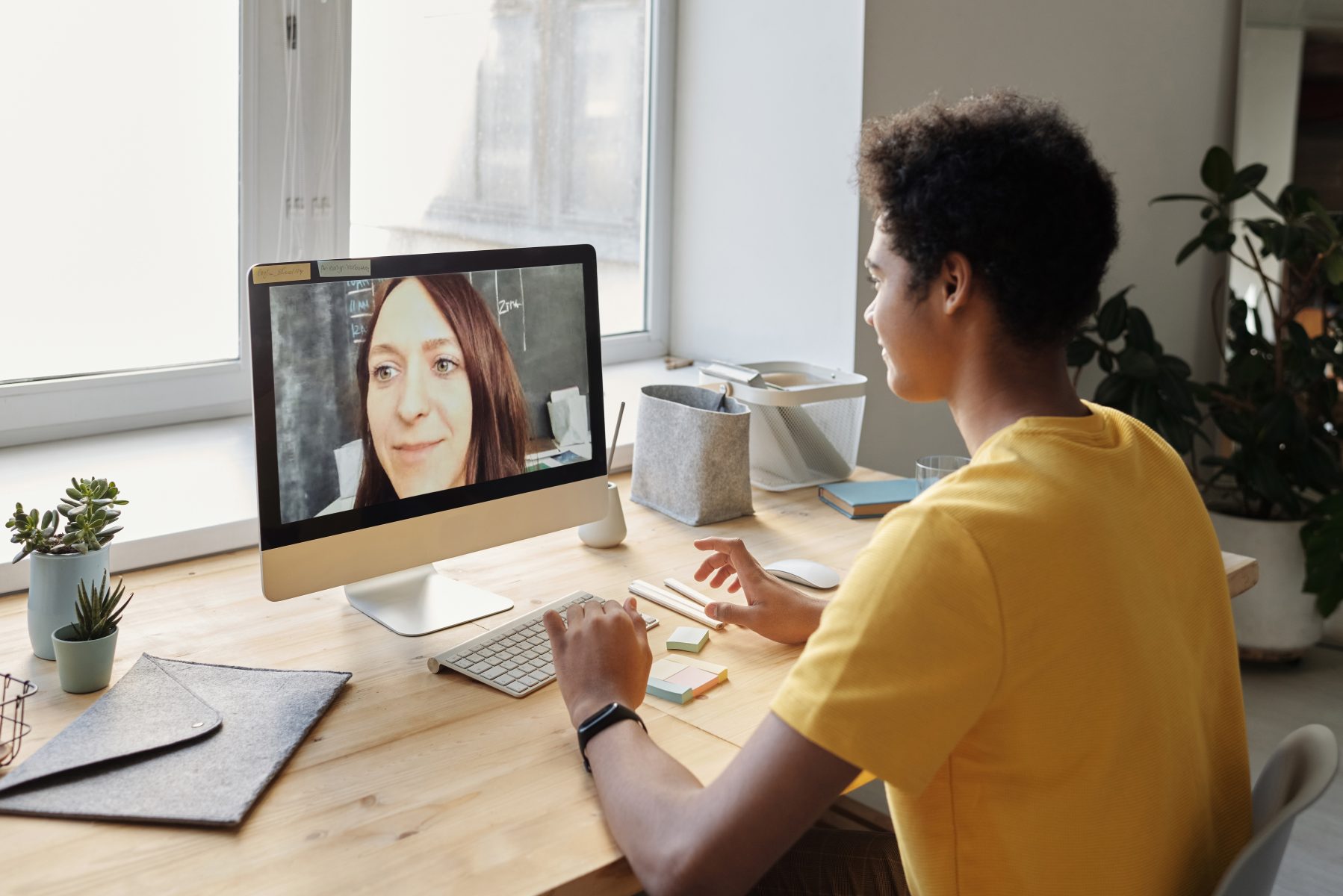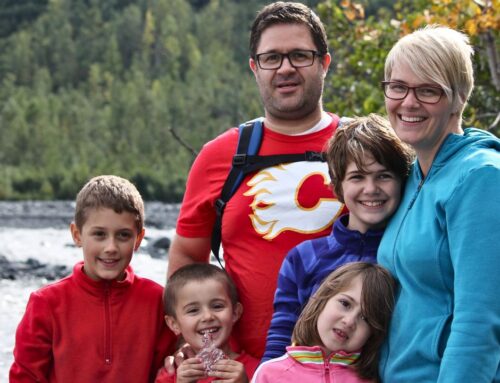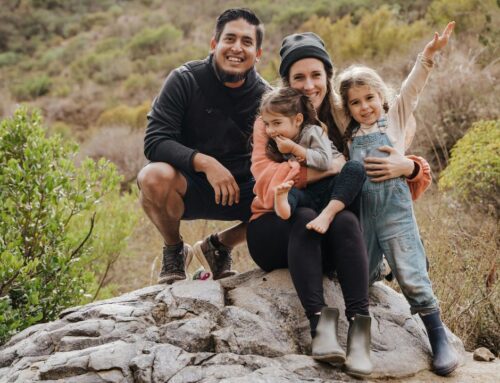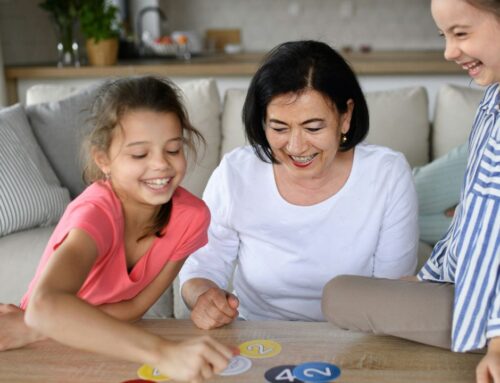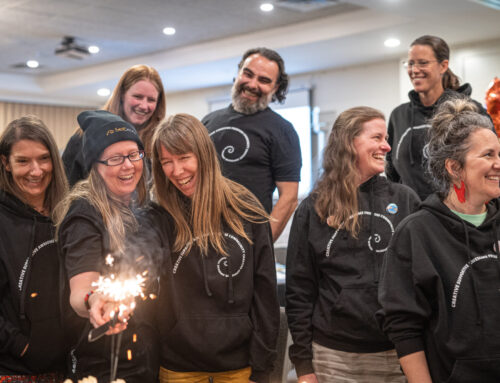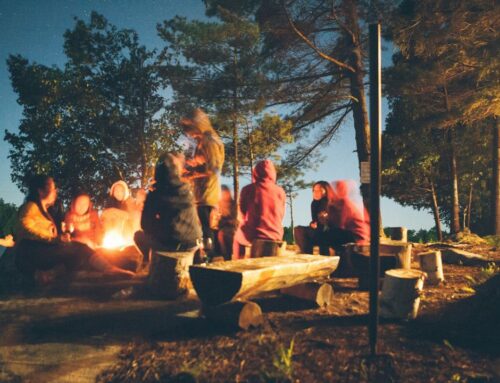At SelfDesign, we believe that learning is enriched and amplified through conversations and relationships with others. In particular, the relationships that develop between our learners, their parents or guardians and our educators drive our approach to personalized learning.
In the early grades, the relationships and conversations that happen between families and learning consultants ensure each child’s learning focuses on the child’s own individual interests, skills, learning styles and learning goals. But as a learner grows and matures, they take on more responsibility for directing their own learning.
When learners begin grade 10 with SelfDesign, many start the learning year by working directly with their learning consultants to develop their own personalized learning plan. From grade 10 to 12, the learner actively chooses the theme through which they will explore courses, collaborates on the nature and conditions of their learning experience, and assumes responsibility for the results they create. This allows their own experience and enthusiasm to guide their learning.
Their learning consultant and learning specialists mentor and support them on that journey.
At first, some young people might find that new responsibility intimidating. But by the time they are in grade 12, many SelfDesign learners find their relationships and regular conversations with their educators are key to their learning success.
Here, some learners from our Class of 2021 who graduated with B.C. Dogwood Diplomas, and a few of our grade 10 to 12 learning consultants share their insights and experiences regarding the learner–educator relationship in SelfDesign. Learners who follow other paths to completion may engage with their educators in different, but still very supported, ways.
Communication opens doors to achieving learning goals
Samayyah says starting SelfDesign’s grade 10 can be a big change for learners.
“You have to actually talk to teachers who are not your parents, which is kind of scary,” she says. “I had to learn to communicate with my learning consultant, because he was really, really helpful.”
The understanding and resulting support that happened because of her effort were key to her successfully meeting her learning goals – preparing for and being accepted in a computer science program at a university in the U.S.
“Communicate with your learning consultant and your learning specialists,” she advises. “Get to know them and tell them your expectations – they can help you get there. Talk to them at the beginning of the semester and throughout the semester. Tell them ‘I want such and such grades’, or ‘I struggle with this’, or ‘I’m trying to achieve this.’ My learning consultant and learning specialists helped me so much.”
“When somebody at that age shares a part of their life with you, it’s an incredible honour,” says Michael, a SelfDesign learning consultant and learning specialist for learners in grades 10 to 12. “For somebody to invite you to witness their growth during that part of their life, when they’re growing and learning so quickly, how can you not be thrilled?”
Hannah, another learner from our Class of 2021, had been enrolled with SelfDesign for a short time in her younger grades and then undertook schooling elsewhere. When she returned to SelfDesign for grade 10, she found it difficult to speak up for herself.
“For my first two years with SelfDesign, I had a very hard time saying what was right for me and what was not right for me,” she says. “I would tend to shy away and not say anything and just continue dealing with something even if I wasn’t happy doing so.”
With time, she became comfortable with her educators and with asserting herself. Now she advises learners entering SelfDesign’s grade 10 to 12 program to “state your truth. This is your learning, and it’s up to you how you want to do it.”
Part of that was her weekly meetings with her learning consultant. “We had the coolest conversations,” Hannah says. “She created such a beautiful, rich learning environment when she was working with me.”
Mentorship and support built on trust
“One of the things I learned from SelfDesign is how important a teacher or guiding mentor can be,” says Makayla, who now studies performing arts at the University of Victoria. “My teachers were just amazing and offered me so many new skills and learning opportunities and ways to look at my work that I’d never considered before. Even the comments I got weekly from my teachers – it was such a mind-opening experience to be find myself discovering, ‘Oh, that’s a new way to look at it.’”
Every week throughout the learning year, learners in grade 10 to 12 take part in our Observing for Learning process with their learning consultant. The reflections about the learning that has taken place over the previous week can happen either as real-time online meetings or as written communications.
During those conversations, the learning consultants listen to their learners as they describe the learning that took place over the previous week. They support their learners as they pursue their learning goals. They serve as objective, supportive sounding boards for new ideas and challenges learners may encounter in the course of their learning. And they help guide each learner towards deeper understanding, new insights into the learning that is happening, and achievable solutions to difficulties encountered.
“Working with learners provides such a rich experience, and quite often I am struck with the sense that I am learning as much from them as they are from me,” says learning consultant Nicolle. “Yet at the heart of what we are doing, there is a connection and trust that builds a foundation upon which we can grow, and I can work to best support each learner’s individual journey.”
“For me, being a learning consultant is about celebrating the individual successes of each learner and providing support in challenging times,” says Evelyne, a learning consultant who supports SelfDesign learners who have been diagnosed with learning challenges and may graduate with a School Completion Certificate. “An important aspect of the relationship is the sense of teamwork and trust that develops. Choosing the right supports and services is key. I think of it like a jigsaw puzzle, and the learner, family and I work together to put the right pieces in place to assist the learner in reaching their goals and dreams. There is no hierarchy, but instead a sense of shared purpose.”
Matt says Evelyne, his learning consultant, helped him develop a growth mindset and to try new things.
“I didn’t always believe I could do new things that I’ve never learned before, but Evelyne always encouraged me,” he says. “She helped me discover that I can. She has always been there for me, and I love how she met me right where I was, because I am easily frustrated.”
For Téa, the weekly check-ins with her learning consultant helped her stay focussed throughout her very busy high school years, when she was fitting her schooling around a demanding, full-time training schedule in circus acrobatics.
In fact, Téa says those conversations became a highlight of her SelfDesign journey.
“We were able to have these nice conversations once a week, he was really encouraging about all the schoolwork I did, and he was a good mentor for me to get me thinking more along those kinds of patterns of always connecting things and always expanding on a thought and making all those reflections on everything I did,” she says. “We could talk things through and keep everything running smoothly. He also helped me recognize when there were opportunities to integrate things into my learning. I would talk it through with him and, in doing that, I would come up with an idea for how I could make it all work. He was just a really good person to talk to, and he had lots of helpful feedback when I needed it.”
According to SelfDesign educator Nicolle, one of the best things about being a learning consultant to learners in SelfDesign’s grade 10 to 12 program is “the process of observing a young learner enter grade 10 with many questions and trying to find their path, to witnessing that same learner grow in their confidence, find their feet, find their voice, and eventually grow their wings.”
She says, “I am truly lucky to be a part of such a rich journey.”
This article is the third in a series on the SelfDesign Blog about learners’ transition to grade 10 at SelfDesign Learning Community.
Learn more about grades 10 to 12 at SelfDesign
Learn more about how grades 10 to 12 differ from earlier grades at SelfDesign
Read learners’ advice and tips for making the most of SelfDesign’s grades 10 to 12

